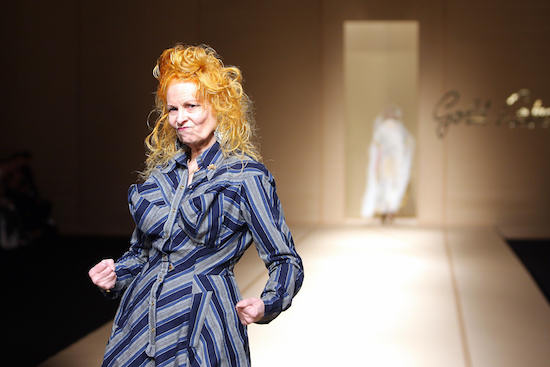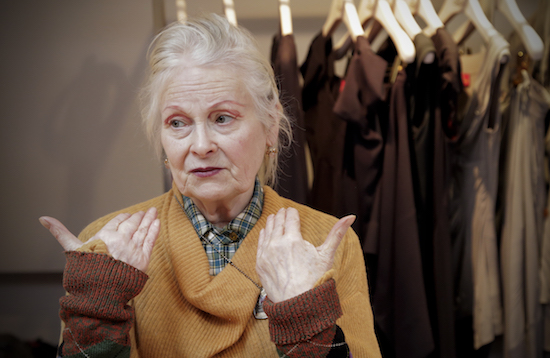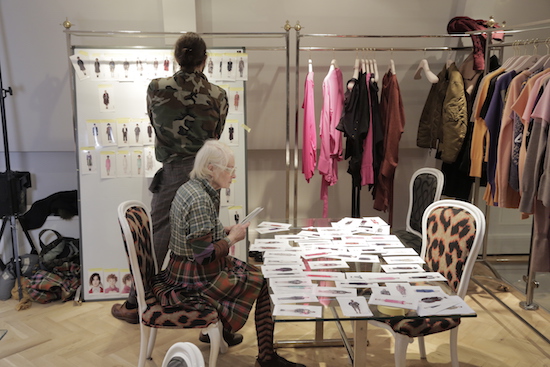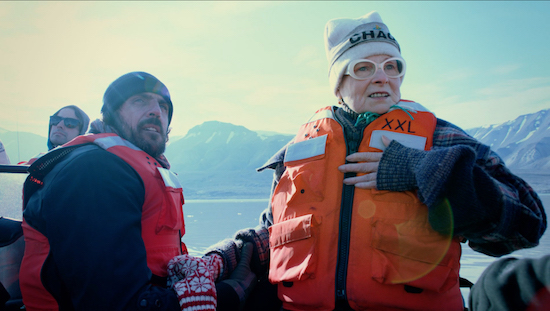Film: Punk for Life
Westwood: Punk, Icon, Activist, Lorna Tucker’s documentary on iconoclastic British designer Vivienne Westwood, has a trim runtime of 80 minutes. Maybe that’s why it feels like there’s a lot missing. How do you encompass the life and work of someone who 1) is half responsible for inventing British punk, 2) has evolved from an anti-establishment outsider into a revered fashion designer and beloved British subject, and 3) has had a fascinating personal life as well? This could have been a documentary series.
With the short shrift given various aspects of Westwood’s life and work, this nonlinear, nonchronological film yields more questions than answers. (Thank goodness for Wikipedia.) So it’s probably best to experience the interviews, archival photos, video clips and stock footage representing Westwood’s 77 years on earth as an impressionistic wash of information and fantastical visuals. In some ways, it’s a fitting framework for a wildly unconventional artist who has never done anything neatly or predictably.
The film begins with current-day Westwood looking overwhelmed as she asks crankily, “Do we have to cover every bit of it? So boring…” She’s reassuringly punk from the get-go.
Tucker largely lets her subject narrate her own story, with input from husband, sons, employees and various others who have known her. We learn that she began making clothes at 11 or 12, around the same time that a painting of the crucifixion instilled the desire to save people and “prevent bad things from happening.” This motivation still drives her work: “You’ve got to cut a figure, be prepared for action and engagement.”
Shown preparing a recent show for London Fashion Week, she’s clearly unhappy with the collection. Dramatically outspoken, she curses and browbeats employees before declaring, “Let’s close the company.” One senses that this is nothing new.
The film delves into Westwood’s working class background, as she recalls leaving art school for teacher training in order to make a living. She marries Derek Westwood just as the ’60s and rock n’ roll make their impact, but they split up soon after son Ben is born.
The intriguing-looking Ben, an erotic photographer turned designer, talks about the disruptive arrival of Malcolm McLaren, whose worldly background and big ideas prove irresistible to Westwood. She recounts their infamous collaboration, which began with selling records in the back of a shop on King’s Road. Eventually the couple would take over the space, selling their provocative handmade clothes. McLaren eventually recruited a few customers to become a band.
At this point in the film Westwood practically rolls her eyes, “Really, if I have to talk about the Sex Pistols…”
Instead, we see curators at London’s Victoria & Albert Museum carefully handling her classic Destroy t-shirt, worn by Johnny Rotten in the late ’70s. It’s a funny juxtaposition, considering how outrageously subversive it was at the time. (In 2004, the V&A mounted the first complete Westwood retrospective.)
Eventually Westwood does talk briefly about the Sex Pistols. “We invented punk,” she says, not exaggerating. She notes that punk affected fashion so much that it soon became a marketing ploy; as a rebuke, she began designing colorful costumes with historical references and decided to enter the real fashion world. According to her, McLaren’s jealousy led to an ugly split. (“I outran him…got intellectually bored.”) Later, Westwood CEO Carlo D’Amario tells of an important contract that was scuttled by a vindictive McLaren. Unfortunately, the latter, who died in 2010, is not around to tell his side of the story.
Almost as fascinating as Westwood herself is her current husband and business partner Andreas Kronthaler, who seems almost mystified by his wife, admitting at one point, “I’m so in love with her.” They met when she took a teaching a job in Austria and he was one of her students. As Kronthaler gradually took over her business, many were suspicious, though it certainly seems to have worked out well for them both.
As the narration zigzags in time, we’re not always sure what year or collection we’re looking at, especially given the timelessness of Westwood’s styles (and of the woman herself). Of course, the clothes are stunning, from provocative fetish-wear to whimsical tartan suits to achingly beautiful gowns, shown in clips from various runway shows (themselves incendiary events). Westwood has covered a lot of fashion ground, not all of it appreciated. One early clip features an incredulous TV talk show audience laughing uproariously at each outfit presented by the designer. Says Joe Corré, Westwood’s son with McLaren: “She got that reaction a lot, but in the end you couldn’t ignore her.”
When she finally wins British Designer of the Year in the early 1990s, it’s a hard-won recognition. She is also recognized at Buckingham Palace with an OBE (an event she attended sans underwear, much to the delight of photographers), later upgraded to a DBE.
With the brand’s success has come explosive expansion with myriad licensing deals and stores opening in cities around the world. Westwood worries repeatedly about losing control over her company, one of the few independent fashion houses left.
The film dwells briefly on her increasing involvement with climate change, among other causes. (Interestingly, there isn’t any mention of her own clothes being sustainably manufactured.) As she spends more time at rallies and other events, Andreas is shown taking on the brunt of running the business, another source of tension. Clearly, it’s all a tricky balancing act.
Reportedly, the designer has distanced herself from Westwood: Punk, Icon, Activist, claiming that Tucker didn’t show enough of the “Activist.” True as that may be, the remarkable personality, history and fashion are what most people want to see in a film about Vivienne Westwood. Though somewhat shambolic and unfocused, Westwood does deliver the goods, as messy and captivating as its subject.
Westwood: Punk, Icon, Activist opens at the IFC Center on Friday, June 8.
—Marina Zogbi





